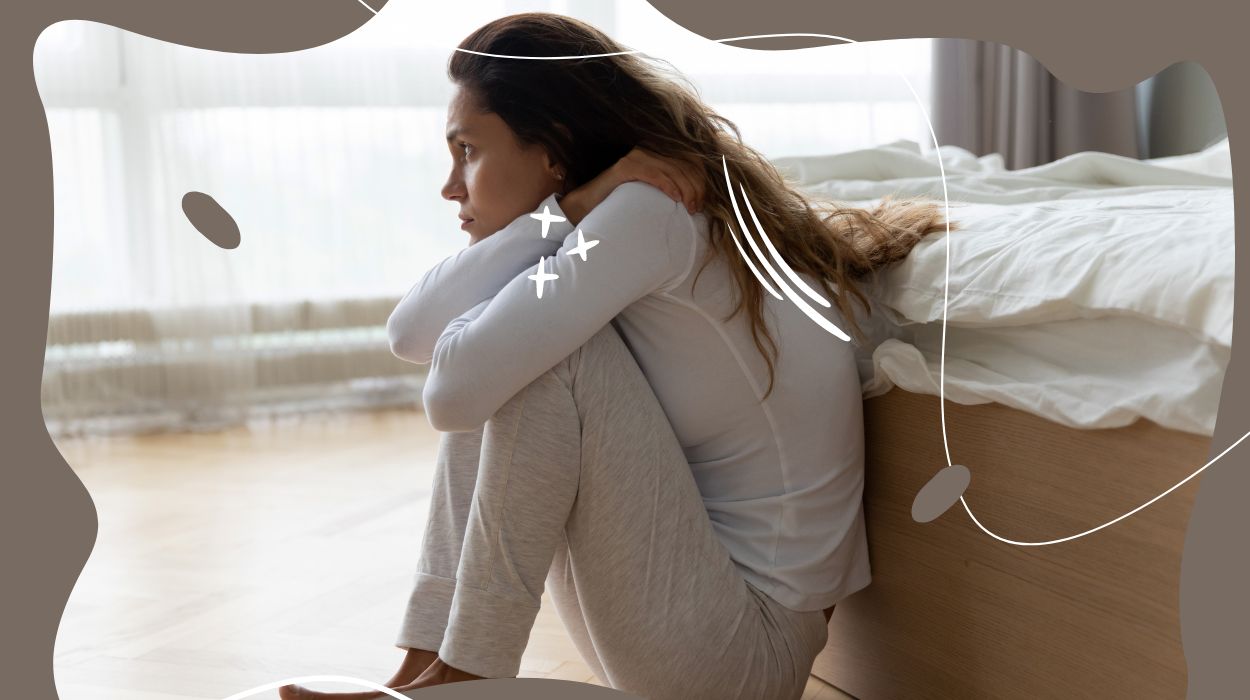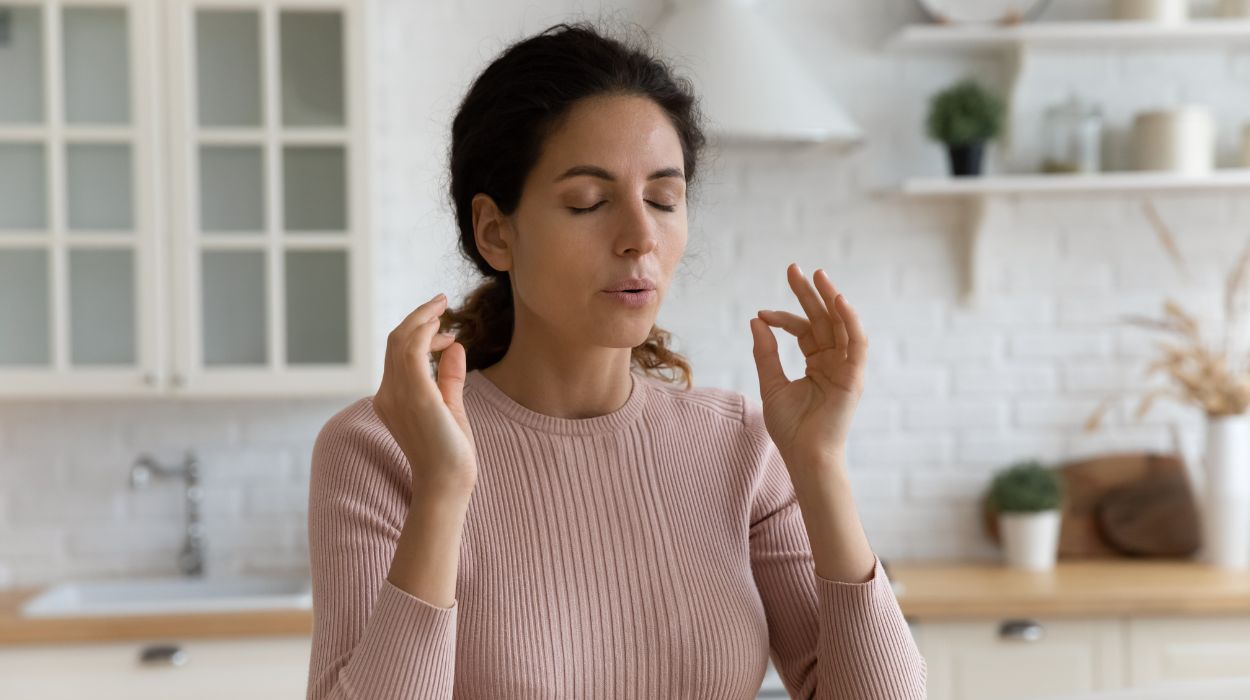 Expert's opinion
Expert's opinion
Expert's opinion
The article is a subjective view on this topic written by writers specializing in medical writing.
It may reflect on a personal journey surrounding struggles with an illness or medical condition, involve product comparisons, diet considerations, or other health-related opinions.
Although the view is entirely that of the writer, it is based on academic experiences and scientific research they have conducted; it is fact-checked by a team of degreed medical experts, and validated by sources attached to the article.
The numbers in parenthesis (1,2,3) will take you to clickable links to related scientific papers.
How To Stop Shaking From Anxiety? 4 Helpful Tips To Treat It 2024

The human body has all kinds of crazy ways of expressing fear. Anxiety can manifest through physical symptoms such as damp palms, dry mouths, body shake, or sweaty armpits. Others experience tightening of the chest when they try to hide feeling nervous.
That probably happens more often than most people realize. We can hide damp palms and dry mouths, fooling people into believing we’re more relaxed than we really are. It’s harder to conceal shaking hands, unfortunately, which can sometimes add to even more anxiety.
“Anxiety Shaking” is a common bodily response to a perceived threat. This symptom is a result of adrenaline preparing your muscles for a fight or flight response. There are a few tricks that can help you reduce shaking from anxiety on the spot.
Managing anxiety is a skill that has to be practiced, like hitting a ball or playing a first-person shooter. The more you learn and practice, the better you’ll end up being. In some emergency situations, supplements or CBD Oil are the fastest treatment to stop your shaking from anxiety. While we might wish for a simple solution, the healthiest way to stop that shaking is to address the anxiety that is causing it.
How To Stop Shaking From Anxiety Attack?
The shaking that comes from anxiety can be classified under physiologic tremors,[1]. Tremors of this sort are common in the presence of certain stressors. When we’re feeling anxious, anxiety tremors become large enough to be visible.
When you become anxious and begin to experience tremors, there are a few helpful tips you can do at the moment to help.
- Concentrate on your breathing[2]
- Focus on your environment
- Relax as much as possible
- Give yourself a break
How To Stop Shaking After Panic Attack?
Breathing exercises may be the number one strategy for dealing with anxiety symptoms. It’s the first strategy most therapists will cover and it forms the basis for a lot of other techniques. Take slow, deep breaths and even out your breathing. Doing so gives you something to focus on other than the physical feelings of anxiety.
Focusing on your environment is a similar strategy. Look around and see what catches your eye. Try to notice the smell of the air or listen to the sounds around you.
Most importantly, recognize that everyone gets anxious feelings. You don’t need to beat yourself up for a physiological reaction that is not fully within your control.
Managing anxiety is a huge subject, with a number of approaches and concepts. It even dips into philosophy at points. For most people, however, understanding the highlights and knowing a few basic strategies is enough. These get lumped together, as they tend to work best as a package deal.
Breath Focus

We’ve talked a bit about focusing on the breath as a way of calming yourself. For example, you could practice deep breathing to keep calm yourself after a panic attack or slow your breathing to reduce your stress hormones. That’s essentially the most basic form of meditation. There are also lots of other varieties that may help with specific problems, grow in complexity, and appeal to different philosophies.
Meditation
When you meditate, you’re practicing putting your mental focus where you want. It’s part of human nature to be easily distracted on occasion. We also have a tendency to put our focus on the things that are most concerning, even if that focus is unhealthy.
Mindfulness
Anxiety is a prime example of that. We get caught up in the aspects of a situation that make us nervous, focusing on those, and spinning them into dire scenarios. That focus on the negative fuels further anxiety, which means we focus more on the stuff that makes us anxious, and so forth, down and down. That’s called an anxiety spiral when we get caught up in negative thought patterns. These anxious thoughts are upsetting us more and more.
The therapy is to sort of snap out of that mindset. A few of the quick tips mentioned distracting yourself from your anxiety. This is why that works, through derailing the spiraling anxiety.
Applying the skills that we learn in meditation,[3], placing our focus where we want and not getting sucked into negative thought patterns, is basically the idea behind mindfulness. Mindfulness is all about identifying the spirals and anxiety triggers. That way, you’ll notice before the anxiety becomes a problem and can use some strategies to defuse it.
Do that until it becomes a habit and eventually you won’t even notice the negative thoughts, let alone get sucked into an anxiety spiral.
How Effective Are Exercise And Healthy Eating In Reducing Anxiety?

You don’t have to be a gym rat, but modern life might just require some sort of organized exercise routine. It’s hard to overstate the positive effects regular exercise can have on your health. Obviously, exercise will improve your physical health a great deal. However, it can also improve your mental health,[4].
We don’t fully understand how exercise helps,[5] reduce anxiety symptoms, though the evidence seems to show that it is. Exercise seems to strengthen a person’s resistance to stress across the board. You can combine exercise with supplements for boosting your mood and energy.
Likewise, studies show a link between eating a healthy diet and reduced stress,[6]. In particular, a diet rich in whole grains, vegetables, and fruits is best, particularly if you can avoid processed foods.
Learn Your Triggers
Most anxieties are pretty standard. Public speaking is always terrifying. Taking tests can be nerve-wracking. Even the most confident people are wary of new social situations. You may have some specific anxieties that you react to in particular, like freaking out over spiders or refusing to get into water over your head. Other anxieties may be more serious.
It can be helpful to examine some of those situations more closely. Is it speaking publicly as a whole or some specific aspect of giving a presentation that causes problems? Are there some social situations that cause more anxiety than others?
With that knowledge, you can start to make some more informed choices. You can choose to avoid the situations that cause you anxiety.
Alternatively, you can face those situations in controlled circumstances. For example, give your presentation to a group of friends first. Experience with a trigger can sometimes make it less likely to cause anxiety.
Anxiety Disorder
It’s true that everyone faces anxiety symptoms in their lives. There’s no getting around it. However, some people experience anxiety disorder to such a degree that it interferes with their ability to live a satisfying life. As an extreme example, people suffering from agoraphobia experience such strong anxiety reactions that they can’t even leave their homes.
When anxiety symptoms begin to make basic aspects of life difficult, then it may rise to the level of an anxiety disorder,[7]. Not all of them are as dire as agoraphobia, but they all can make life difficult. Some types of anxiety disorders include:
- Generalized Anxiety Disorder
- Panic Disorder
- Social Anxiety Disorder
- Separation Anxiety Disorder
The good news is that there are lots of ways that a therapist can help you manage and reduce your anxiety. You may want to seek out a professional if your anxiety:
- Is intense enough to cause discomfort
- Lingers for a long time beyond the triggering incident, even days
- Interferes with tasks of basic living
- Have a serious effect on your overall life.
The standard line is that stress breeds anxiety. We find ourselves in stressful situations, which quite naturally creates some anxiety. That is true a lot of the time, without question. Stressful situations arise and we end up sweating and shaking from anxiety.
However, many intelligent people have also observed that anxiety breeds stress. That is, if we perceive something as creating anxiety, it can add stress to our lives. Our negative patterns of thinking create stress where there doesn’t need to be any. With a little practice and persistence, it’s possible to bring anxiety under control.
+ 7 sources
Health Canal avoids using tertiary references. We have strict sourcing guidelines and rely on peer-reviewed studies, academic researches from medical associations and institutions. To ensure the accuracy of articles in Health Canal, you can read more about the editorial process here
- Bhatia, K., Bain, P., Bajaj, N., Elble, R.J., Hallett, M., Louis, E.D., Raethjen, J., Stamelou, M., Testa, C.M. and Günther Deuschl (2017). Consensus Statement on the classification of tremors. from the task force on tremor of the International Parkinson and Movement Disorder Society. [online] 33(1), pp.75–87. doi:https://doi.org/10.1002/mds.27121.
- Maleki, A., Majid Ravanbakhsh, Saadat, M., Mehdi Sayah Bargard and Seyed Mahmoud Latifi (2022). Effect of breathing exercises on respiratory indices and anxiety level in individuals with generalized anxiety disorder: a randomized double-blind clinical trial. [online] 34(4), pp.247–251. doi:https://doi.org/10.1589/jpts.34.247.
- van, Faber, M.J., Anne, Peerbolte, T.F., Bloem, B.R. and Helmich, R.C. (2020). Stress and Mindfulness in Parkinson’s Disease: Clinical Effects and Potential Underlying Mechanisms. [online] 36(1), pp.64–70. doi:https://doi.org/10.1002/mds.28345.
- Sharma, A., Vishal Madaan and Petty, F. (2006). Exercise for Mental Health. [online] 08(02), pp.106–106. doi:https://doi.org/10.4088/pcc.v08n0208a.
- Anderson, E. and Geetha Shivakumar (2013). Effects of Exercise and Physical Activity on Anxiety. [online] 4. doi:https://doi.org/10.3389/fpsyt.2013.00027.
- J. Douglas Bremner, Kasra Moazzami, Wittbrodt, M.T., Nye, J.A., Lima, B.B., Gillespie, C.F., Mark Hyman Rapaport, Pearce, B.D., Shah, A.J. and Vaccarino, V. (2020). Diet, Stress and Mental Health. [online] 12(8), pp.2428–2428. doi:https://doi.org/10.3390/nu12082428.
- National Institute of Mental Health (NIMH). (2023). Anxiety Disorders. [online] Available at: https://www.nimh.nih.gov/health/topics/anxiety-disorders.



